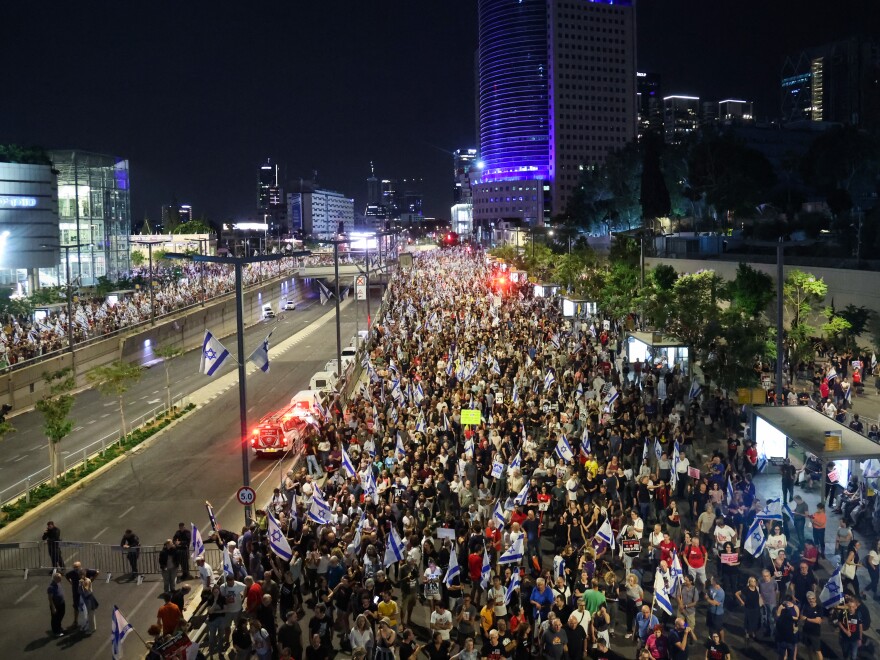Updated May 18, 2024 at 19:08 PM ET
TEL AVIV, Israel — A key member of Israel's war cabinet said Saturday he would quit the government in three weeks if Prime Minister Benjamin Netanyahu does not advance a plan to replace Hamas in Gaza.
The ultimatum by Benny Gantz, a former army chief and current minister in Israel's three-member war cabinet, reflects growing discontent among Israel's leadership about the protracted war in Gaza and Netanyahu's far-right political partners. The move could pose a significant challenge to the stability of Netanyahu's government.
Netanyahu leads the military offensive in Gaza through his three-member war cabinet with Gantz and Defense Minister Yoav Gallant. Both men in the span of a few days have accused the prime minister of neglecting an exit strategy from Gaza that would see another Palestinian civilian entity take over governing the territory. Gallant aired his criticism of Netanyahu's handling of the war in a speech Thursday.
In his speech and in a letter to Netanyahu on Saturday, Gantz presented a six-point plan he demanded the prime minister adopt by June 8: Prioritizing the return of Israeli hostages from Gaza; returning Israeli civilians displaced by fighting near the restive Lebanon border to their homes by September; advancing a normalization deal for diplomatic ties with Saudi Arabia; creating a governing body, overseen by the U.S., European and Arab parties, and unspecified Palestinians, to manage Gaza's civilian affairs after the war; and agreeing to a law for equal military and national service including ultra-Orthodox Jews who have long been exempt.
"We need a strategic reversal," Gantz said in his televised speech. To Netanyahu, he said, "The choice is in your hands ... it is the moment of truth."
Gantz, a centrist, said if Netanyahu did not agree to his plan, he would quit the government and seek an agreed-upon date for early national elections.
Netanyahu relies on the support of far-right politicians for his governing coalition, many of whom have a different vision for Gaza's future: to encourage Palestinians to leave and to claim the territory as Israeli by building Jewish settlements there. Some of them also say Israel's military campaign in Gaza takes precedence to a negotiated deal with Hamas for the return of Israeli hostages.
Netanyahu has resisted calls by the U.S. for Hamas to be replaced with a reformed Palestinian Authority, a Western-backed Palestinian leadership. He also opposes the idea of a future Palestinian state, which Saudi Arabia has seen as a precondition for a normalization deal with Israel.
If Gantz quits the government, it would not automatically topple Netanyahu's coalition. But it would remove a key counterweight to Netanyahu's far-right partners, leaving Netanyahu with little room to maneuver between U.S. demands to wind down the war and his coalition's demands to intensify it.

If Netanyahu can keep his coalition intact until parliament goes on recess in late July, he could still hold onto power through the end of the year, political commentator Daphna Liel said on Israeli Channel 12.
Large demonstrations took place Saturday evening in Tel Aviv and across Israel demanding a deal to free the remaining Israeli hostages in Gaza, and calling for early elections. One Tel Aviv demonstration included speeches by family members of hostages, as well as the ambassadors of the U.S., U.K. and Germany, and a videotaped address by Hillary Clinton.
Jonathan Dekel-Chen, whose son, Sagui Dekel-Chen, was kidnapped by Hamas on Oct. 7, says that Netanyahu's government is not doing enough. "Not prioritizing the fate of the hostages, preferring to emphasize what they consider to be victory, their proposed victory in war," Dekel-Chen said.
"For me, and I think for the vast majority of the country — and demonstrations like this show it — all over the country, that the country doesn't agree with, that. The only victory for Israel, if there even is one, begins with the return of the hostages."
Also Saturday, Israel's army said it recently retrieved an additional body of an Israeli civilian killed on Oct. 7 and taken by Hamas militants to Gaza, along with three other bodies of Israelis. Israel says 128 hostages are believed to remain in Gaza, including 38 whom Israel has declared as dead.
Gaza health officials report more than 80 Palestinians killed in the past day
Heavy fighting continued across the Gaza Strip on Saturday, including in eastern Rafah, as health officials there report more than 80 Palestinians killed in the past day. The U.N. reports women and children were among those killed in Israeli strikes in recent days. Several Israeli soldiers were killed this week by friendly fire. Israel says troops located tunnel shafts and weapons facilities, and killed militants.
The head of the U.N.'s main agency in Gaza says nearly half of the population of Rafah, or around 800,000 Palestinians, have fled the southern Gaza city since Israeli troops entered the eastern part of the city two weeks ago.
In the occupied West Bank, rare Israeli airstrikes killed a prominent Palestinian militant in the city of Jenin, Israel's military said. Along the Lebanon-Israel border, Israel struck Hezbollah targets, and there was fire from Lebanon onto Israel.
Also Saturday, the U.S. military said the first trucks of aid moved ashore from a floating pier off Gaza, with the aim of alleviating hunger in Gaza. U.N. officials said more than double the amount of aid expected to be delivered by sea is needed to meet the need in Gaza.
Copyright 2024 NPR




